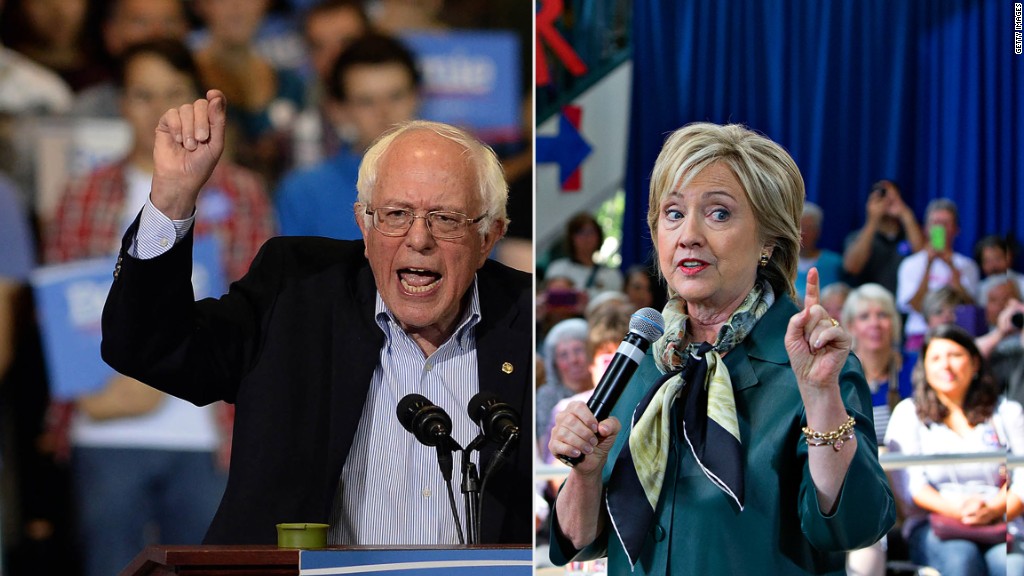
Both Hillary Clinton and Bernie Sanders want to give Americans a raise.
Reducing income inequality is at the center of both Democratic presidential frontrunners' campaigns. Their goal: To lift up working Americans and shore up the middle class.
Just how they plan to do this is almost certain to come up on Tuesday night when CNN hosts the inaugural Democratic debate.
The debate will give them the opportunity to flesh out their economic plans and to differentiate themselves from one another since their talking points are similar in many ways. For instance, both advocate for raising the minimum wage, investing in infrastructure to create good-paying jobs and making college more affordable.
Clinton is positioning herself as the champion of everyday Americans.
Sanders, meanwhile, says he's a longtime fighter for the working class and rails against the greed of the Top 1%. He wants the federal government to play a bigger role -- making tuition free at all public colleges and expanding Medicare to all.
The details remain scarce, but here's what we know so far about how the two candidates would combat the growing gap between rich and poor in this country.
Jobs and income
Clinton: Invest in infrastructure and scientific research. Create a national infrastructure bank, initially funded by Congress, that would make loans for projects like improving highways, bridges and broadband service. The loans would be matched by private sector investments or local governments. Create a $1,500 tax credit for businesses that hire apprentices. Protect workers' collective bargaining rights. Provide a tax credit to employers contributing to workers' profit-sharing plan.
Sanders: Invest $1 trillion over five years in infrastructure. Reverse trade policies, such as NAFTA, that he says have cost jobs and lowered wages in America. Create 1 million jobs for disadvantaged youth. Make it easier for workers to join unions.
Taxes
Clinton: Increase the capital gains tax rate on the wealthy if they sell investments within less than six years of purchasing them. Close "loopholes and expenditures for the most fortunate."
Sanders: Stop companies from shifting profits overseas to avoid U.S. income taxes. Lower the threshold on inheritances subject to the estate tax to $3.5 million and raise the rate to as high as 55%. (Currently, the estate tax applies only to inheritances above $5.43 million and top rate is 40%.) Create a billionaire surtax of 10% on the wealthiest estates. Tax capital gains and dividends as income.
Family leave
Clinton: Supports paid family leave and sick leave.
Sanders: Require employers to provide at least 12 weeks of paid family and medical leave, two weeks of paid vacation and seven paid sick days.
College
Clinton: Ensure students never have to pay more than 10% of their income toward their college debt. Continue President Obama's free tuition program at community colleges. Provide incentives to states that agree to provide no-loan tuition at four-year public colleges and universities.
Sanders: Institute free tuition at all public college and universities. Lower interest rates on student loans.
Minimum wage
Clinton: Raise the federal minimum wage to $12 an hour and support states and localities to increase their rate even higher.
Sanders: Raise the federal minimum wage to $15 an hour by 2020.
Health care
Clinton: Lower out-of-pocket costs by allowing families to see the doctor three times a year without having to meet their deductible first. Create a $5,000 tax credit for families with high medical expenses. Lower drug costs by allowing Medicare to negotiate prices with pharmaceutical companies.
Sanders: Expand Medicare to all Americans. Allow Medicare to negotiate drug prices. Import drugs from Canada. Prohibit deals that keep generic drugs off the market.
Will either of these plans work?
All of these efforts, however, may ultimately have little impact on lifting Americans' wages or spurring the creation of more good jobs.
Presidents can promote policies that put some money back in people's pockets through tax breaks or lower rates and they can create some jobs through stimulus policies such as infrastructure spending -- President Obama did both of these.
But many experts point to a fundamental shift in the economy and the fact that worker productivity is rising faster than wages. The U.S. economy has shifted more to service-oriented jobs and away from manufacturing and production, which were the strongholds of unions and middle class wages.
"The president alone cannot do very much," said Branko Milanovic, senior scholar in the Luxembourg Income Study Center in New York City. "[This is] in part because of the gridlock or unwillingness of the Congress to move, but in part also because the options are limited."


